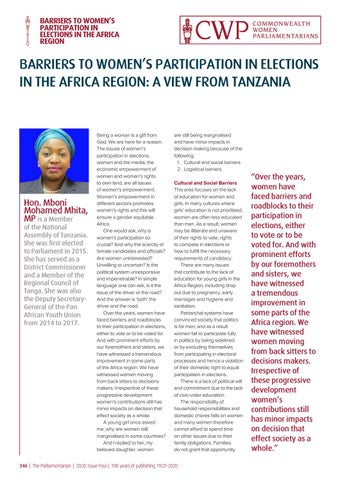BARRIERS TO WOMEN’S PARTICIPATION IN ELECTIONS IN THE AFRICA REGION
BARRIERS TO WOMEN’S PARTICIPATION IN ELECTIONS IN THE AFRICA REGION: A VIEW FROM TANZANIA
Hon. Mboni Mohamed Mhita, MP is a Member of the National Assembly of Tanzania. She was first elected to Parliament in 2015. She has served as a District Commissioner and a Member of the Regional Council of Tanga. She was also the Deputy SecretaryGeneral of the Pan African Youth Union from 2014 to 2017.
Being a woman is a gift from God. We are here for a reason. The issues of women’s participation in elections, women and the media, the economic empowerment of women and women’s rights to own land, are all issues of women’s empowerment. Women’s empowerment in different sectors promotes women’s rights and this will ensure a gender equitable Africa. One would ask, why is women’s participation so crucial? And why the scarcity of female candidates and officials? Are women uninterested? Unwilling or uncertain? Is the political system unresponsive and impenetrable? In simple language one can ask, is it the issue of the driver or the road? And the answer is ‘both’ the driver and the road. Over the years, women have faced barriers and roadblocks to their participation in elections, either to vote or to be voted for. And with prominent efforts by our foremothers and sisters, we have witnessed a tremendous improvement in some parts of the Africa region. We have witnessed women moving from back sitters to decisions makers. Irrespective of these progressive development women’s contributions still has minor impacts on decision that effect society as a whole. A young girl once asked me, why are women still marginalised in some countries? And I replied to her, my beloved daughter, women
are still being marginalised and have minor impacts in decision making because of the following: 1. Cultural and social barriers 2. Logistical barriers. Cultural and Social Barriers This area focuses on the lack of education for women and girls. In many cultures where girls’ education is not prioritised, women are often less educated than men. As a result, women may be illiterate and unaware of their rights to vote, rights to compete in elections or how to fulfill the necessary requirements of candidacy. There are many issues that contribute to the lack of education for young girls in the Africa Region, including drop out due to pregnancy, early marriages and hygiene and sanitation. Patriarchal systems have convinced society that politics is for men; and as a result women fail to participate fully in politics by being sidelined or by excluding themselves from participating in electoral processes and hence a violation of their domestic right to equal participation in elections. There is a lack of political will and commitment due to the lack of civic-voter education. The responsibility of household responsibilities and domestic chores falls on women and many women therefore cannot afford to spend time on other issues due to their family obligations. Families do not grant that opportunity
346 | The Parliamentarian | 2020: Issue Four | 100 years of publishing 1920-2020
“Over the years, women have faced barriers and roadblocks to their participation in elections, either to vote or to be voted for. And with prominent efforts by our foremothers and sisters, we have witnessed a tremendous improvement in some parts of the Africa region. We have witnessed women moving from back sitters to decisions makers. Irrespective of these progressive development women’s contributions still has minor impacts on decision that effect society as a whole.”




